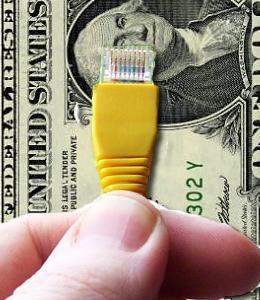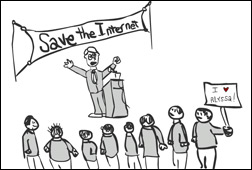Strategic Liberalism and Media Reform

Congress is busy rewriting the rules for telecommunications policy and judging from the bill that passed in the House June 8, we are in for more of the same deregulatory policies and neoliberal principles that informed the 1996 Telecommunications Act. The bill seeks to make it easier for phone companies to offer video programming by stripping municipalities of the authority to oversee video franchising, thus streamlining the process at the national level. Once phone companies begin expanding video service in areas with cable television, cable companies will also be exempt from certain local franchising obligations. The House also voted down a clause that would have guaranteed so-called “net neutrality,” which would prevent broadband service providers from discriminating against content providers – a principal that had been in place before last year when the Federal Communications Commission (FCC) changed the regulatory status of broadband internet service from a “telecommunications” service to an “information” service.
As is typical of inside-the-beltway politics, despite broad opposition to this bill from public interest groups, the Bells won the day by filling House members' campaign coffers. But for my purposes here, I'd like to briefly consider how the campaigns for and against this legislation challenge or reproduce the neoliberal frameworks that have dominated telecommunication policy in recent decades – the master narratives that assign government the role of facilitating free market competition to optimize consumer choice.
Most of the campaigning and public debate surrounding this bill has been directed toward the issue of net neutrality rather than video franchising. It should not be surprising that the opponents of net neutrality framed their opposition in classical neoliberal speak, but the starkness and effective persistence of their ideological use should not be dismissed. FreedomWorks, the organization founded in 1984 by now former House majority leader Dick Army has orchestrated a media campaign opposing net neutrality. As the organization's spokesperson professed, “The debate over net neutrality is a fundamental choice between free market innovation and top-down government regulation. The conservative position should be to promote the development of new technologies that will provide consumers better service and more choice, not regulate the Internet in a snap-shot of time. The Internet is still evolving and government regulation will interfere with innovation by penalizing investment in the Internet backbone. The Internet has developed free of government interference, and this is a classic example of government not being able to resist the temptation to create new regulations.” FreedomWorks reinforced this idea that government interventions impede the growth of the internet by creating mock ads that depict Edward J. Markey and Hilary Clinton (the House and Senate proponents of net neutrality) as neutering veterinarians. The public officials are shown smiling next to photographs of pets waiting to have their private parts snipped, with a tagline that reads: “Be responsible. Let us 'Fix' the internet.”

Cingular, Bell South, AT&T and other corporate interests created two websites to oppose net neutrality. “The Hands Off the Internet” site uses less sarcastic methods but with similar neoliberal force in situating their two principals of “support for an unregulated approach to Internet access in which consumers, not government, choose the method that is best for them” and “opposition to government attempts at regulating and/or taxing Net content or commerce” next to a photograph of an African American mother and daughter happily surfing the internet together. The other website, netcompetition.org, uses the same photograph under its site's tageline, “an e-forum promoting competitive internet choices for consumers.”
On the other side of the issue, The Free Press has coordinated a broad-based coalition in support of net neutrality that includes over 700 organizations from the conservative Gun Owners of America and the Parents Television Council to the liberal advocacy groups such as the Media Access Project and the Consumer Federation of America. Their outreach website, savetheinternet.com, has generated nearly 800,000 petition signatures and much attention in the blogosphere. They argue that without net neutrality provisions, the Bells and cable companies could offer their corporate clients faster connections while slowing the rest of us down. However, the movement's stated principles support rather than challenge neoliberal principles, perhaps because of its broad coalition and strategic outreach: “The Coalition believes that the Internet is a crucial engine for economic growth and free speech. We are working together to urge Congress to preserve Network Neutrality, the First Amendment for the Internet that ensures that the Internet remains open to innovation and progress.”
Stanford Law professor Lawrence Lessig and media scholar Robert W. McChesney have been effective advocates for the movement and published an op ed in the Washington Post on the day of the House vote titled “No Tolls on the Internet.” In convincing and accessible prose they made the case that we are facing a choice between the internet as free, open and democratic versus an internet that looks more like the gatekeeping and toll charging cable TV. But their arguments, too, support the liberal ideals that new technologies and free competitive markets can create the “neutral” conditions for economic progress and democracy: “Most of the great innovators in the history of the Internet started out in their garages with great ideas and little capital. This is no accident. Network neutrality protections minimized control by the network owners, maximized competition and invited outsiders in to innovate. Net neutrality guaranteed a free and competitive market for Internet content. The benefits are extraordinary and undeniable.” Certainly we should not underestimate the critical importance of non-discrimination rules in telecom policy for maintaining the open architecture of the internet. But it is also a policy that largely fits under liberal frameworks for policy governance – a minimized role for government that requires certain enforcement powers (non-discrimination) but no mandates or state role in securing universal broadband access.

It has been in this very area of broadband access that the liberal frameworks for US telecom policy have failed, especially when compared to other countries. For example, in 2005 the US ranked 16th worldwide in broadband penetration, behind the top five of South Korea, Hong Kong, Netherlands, Demark and Canada. Although in some cases population densities are important factors, telecom scholars agree that these national penetration rates have been achieved through federal governments taking a leading role in creating a vision and structure, implementing widespread digital literacy programs, investing in infrastructure and promoting universal service through subsidies and grants. Canada's broadband penetration is 77% compared to 57% in the US, in part because the Canadian government initiated a National Broadband Taskforce in 2001 that supported broadband infrastructure development, subsidized pilot programs at the community level, and delivered electronic government services that stimulated demand for broadband capacity. Similarly, the South Korean government invested $11 billion between 1998-2002 to support infrastructure build outs, broadband in classrooms, digital literacy programs and tax incentives for wiring particular areas for broadband. In Japan where broadband penetration is well ahead of the US, in 2002 100 kilobits of broadband access cost 9 cents while in the US it cost $3.53. In France broadband capacity is 1/11th the cost that Verizon charges in the US. The US model (the 1996 Act) that created facilities-based competition among phone companies, the regional Bells and cable companies to stimulate competition and infrastructure investments in new services such as broadband proved a resounding failure — new entrants into local service mostly brokered capacity rather than invest in last mile broadband upgrades and the Bells refused to make upgrades because they did not want to subsidize these new local service providers.
Recent momentum for closing the digital broadband divide in the US has come from wireless broadband developments and the struggle for local governments to preserve the legal rights to offer services to citizens despite the well funded lobbying campaigns of the Bells and cable companies to limit these rights. Though these local government initiatives propose using tax dollars to create universal wireless broadband, neoliberal master narratives are persistent even in organizations that support these local government initiatives. Consider the Freepress's advocacy statement in support of these wireless broadband programs: “High-speed Internet access is fast becoming a basic public necessity — just like water, gas or electricity. But far too many Americans find themselves on the wrong side of the digital divide, unable to get connected or afford expensive broadband service. To address these concerns, hundreds of localities across the country are working with innovative businesses to roll out broadband service that is cheaper and faster than what the big cable and telephone companies offer. In response, the network giants have tried to outlaw these local competitors at the state and federal level. Now Congress has the chance to create a truly free market by ensuring that local governments are freed to decide what technology best serves their citizens.” Here, even a tax-funded, government administered plan is couched in the neoliberal language of “free markets.” Also, wireless broadband activists have shown a healthy distain for local government involvement in wireless broadband services.

While the media reform movement has focused their organizing around the net neutrality provisions in the Congressional telecom reform bills, less attention has been focused on the proposed changes in video franchising which is central to the recently passed House bill that strips local municipalities of their authority to oversee the franchising process. The proceedings from the February 2006 Senate hearings on video franchising reveal a conceptual split between the public interest advocates with roots in internet activism and those in the television reform community. The organizations that have worked in the trenches of local franchising for years, including the National Association of Telecom Officers, the National League of Cities, the National Conference of Mayors and the Alliance for Community Media (the cable public access movement), forcefully made the case that without local oversight, national franchising would allow new entrants to redline their way to profitability and undermine local community participation in developing community access television. However, Public Knowledge, the advocacy group focused on intellectual property issues and the defense of a “vibrant information commons,” supported national video franchising. Their hearing statement was replete with the master narratives of liberalization: “Public Knowledge believes that competition provides consumers with the widest choice of video services at the lowest prices. While the local franchising model produced many important benefits over the past 40 years, it also created disadvantages both for incumbent and competitive video service providers.” While Public Knowledge encouraged Congress to support net neutrality, sustain adequate capacity for public, educational and governmental access TV channels and embrace universal broadband principles, its commitment to easing regulations as a means of increasing competition is consistent with the neoliberal principles enshrined in the 1996 Act. History has demonstrated that when the understaffed FCC is invested with oversight responsibilities, rather than local officials, little is done to hold service providers accountable for redlining practices or local access provisions. Public Knowledge also continues the traditions of digital technology enthusiasts who have juxtaposed the promises of new media against the limitations of old media (typically coded as television): “As we undertake this discussion of video franchises, we must recognize that we are not only talking about a service — we are talking about a technology and transport mechanism with capabilities far beyond ordinary video programming services. The decisions Congress makes regarding video regulation will impact the rollout of new, sophisticated broadband conduits that will carry not only video, but also data and telephone services. Rather than splitting hairs, or hair-thin fiber, Congress should recognize that it is opening the way not only for video into the home, but for advanced broadband offerings.” So we should care less about regulations that might lower cable TV bills or ensure resources for public access TV because these “ordinary video” services will be transcended by that something special that will emerge from broadband.
As the debate over telecom reform moves to the Senate I do not want to suggest that preserving local video franchising should be more important than fighting for net neutrality or that the game is already won because of the financial might of corporate lobbyists. But I do want to suggest that we think of the media reform efforts as part of a larger movement to challenge the master narratives of neoliberalism that have prevailed at all levels of social policy. And we should remember that the revolutionary zeal surrounding the emergence of broadband technologies in the 1970s not only served as an important catalyst for deregulating the telecom sector, but also provided a foundation for the ascension of neoliberal policies across sectors. The nacent technology argument persists – let the market decide because the technology is “sill evolving.” We should all lobby for net neutrality, but also understand that this will not create a “neutral” space for a democratic media to bloom without the kinds of state redistributive programs that countries outside the US have embraced. In thinking about whether to support national or local video franchising we might think about Kevin Robins's and Frank Websters' arguments that rather than aspire to a “technocultural objective of transcending – or annihilating – distance,” we should rather embrace the disorderly possibilities inherent in “contemporary urban cultural politics” – a choice between the messy and uncertain material encounters at the local broadband hubs versus the “efficient” green lighting processes that take place in distant Washington corridors. A strategic liberalism might bring together the right and the left on an issue such as net neutrality, but perhaps we need to work toward creating a movement that provides a more coherent and sustaining alternative to the neoliberal economic, social and cultural politics that got us here.
Image Credits:
3. WFMU
Please feel free to comment.
Excellent summary of the issues and stakes involved in this year’s momentous policy debates. It’s striking to see just how perniciously effective the neoliberal framing of government has been for the past 30 years, to the point where the phrase the “free market” is bandied about across political spectra with little or no reflection.
My gut feeling is that this era (the mid-late 00s) is experiencing more (and more complex) change in media policy, production, distribution, and reception, than at any point since 1945. We need more work like John’s to put these times in context, and better prepare for their consequences.
On the level of pure pragmatics, my gut also tells me that the Big Guns (the almighty telcos) would sacrifice their children to ram this legislation through in this Congress (even if it just sneaks under the wire, in the dead of night, just after New Year’s Day). Not that even a Democratic congress would necessarily stop or slow down their plans, but why should they take the chance?